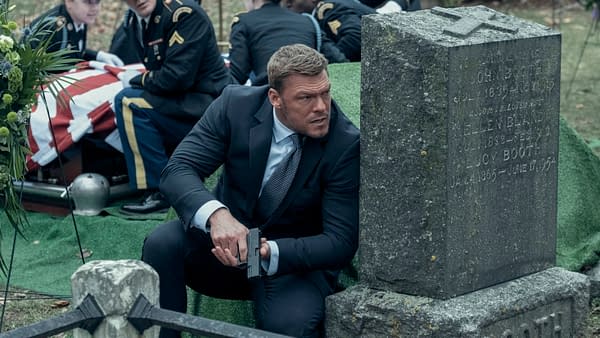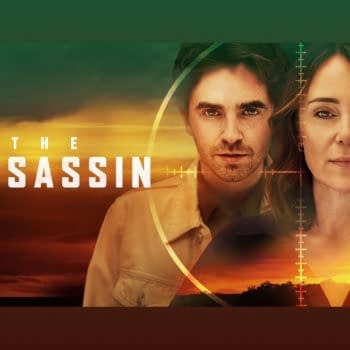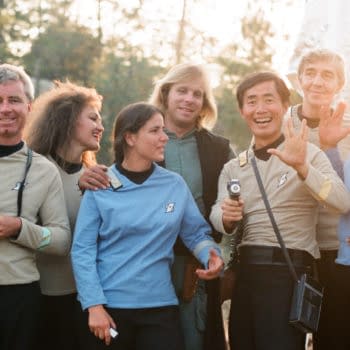Posted in: Amazon Studios, TV | Tagged: lee child, Reacher
Reacher Creator Lee Child on Inspirations, Character's Origins & More
Lee Child discussed the ways that his life influenced the creation of Jack Reacher during an interview with BBC Radio 4's This Cultural Life.
Prime Video's Alan Ritchson-starring Reacher is one of the biggest shows on the streaming service (next to The Boys), with creator Lee Child's Jack Reacher novels having sold over 100 million copies worldwide by now. On BBC Radio 4, This Cultural Life interviewed Child about his life and the inspiration behind the creation of Jack Reacher.

Jack Reacher is Goliath as the Good Guy
Child talked about his origins from an aspirational working-class family, and the one pleasure his parents let the kids indulge in was books, so he read the Ladybird books (a British line of picture books that every British kid grew up on) as a child. His older brother is a nuclear physicist now. Child talked about how he read about David and Goliath as a kid. Jack Reacher, a giant, hulking mountain that walks like a man at six feet five inches, over two hundred pounds, and fists the size of Thanksgiving turkeys, was an unstoppable force with a deductive, strategic brain to match. Child's main question when he created Reacher was, "Can Goliath be the good guy? How would he be the good guy?"
The True Origin of Jack Reacher
Child had an 18-year career in British TV at the respected but now dead network Granada TV. He became a shop steward (UK term for union rep) for the employees. Then, they introduced the 1990s concept of new management that aimed for maximum profit but union-busting and mass layoffs. Shop stewards would not only be fired but blacklisted from the industry. That became two years of warring with the bosses where Child conducted covert operations like Reacher did as a military policeman as he and some employees stayed in the office after hours and looked through the office files and memos of the bosses' plans, including who they were going to fire without grounds or warning, including finding a memo about plans to fire him. It was fun, if grueling. He knew he was going down but he was going to go down fighting.
When they finally fired him, he spent two years unemployed and started writing books to try to make money. The Reacher books were his revenge: the story of a man who had been downsized out of his lifelong career and just got on with his life with no more ties, home, or obligations. He talks about the aspirational part of James Bond movies, which is not the sex and violence but the ability to travel to exotic, faraway places that working-class people wouldn't otherwise imagine. At one point in the book, when someone asks Reacher why he fights the bad guys, he says someone's got to look out for the little guy. When pressed on whether he really cares about the little guy that much, Reacher admits, "Not really. I just hate the big guys who think they can get away with anything."

The Origin of The Name
Longtime fans know this already. Child was in a supermarket and, being quite tall, helped a little old lady reach an item from a top shelf. His wife remarked that if all else failed, he could also get a job as a professional reacher in a shop. That became Jack Reacher's name, a verb that is easily remembered.
On the Violence in the Stories
The violence of the Reacher books is informed by Child's experience of life in 1960s working-class Birmingham, which was defined by inarticulate rage where arguments were often resolved in fights, though generally non-lethal. He got into an academic high-flying school, so he wore the school's uniform which made him a target of the other kids on the streets. That meant an average of two fights every day – and he was a big kid and a big guy. The choreographed ballet of Reacher's fights is really a heightened version of the fights he got into when he was 9 and 10 years old.
How "Dances With Wolves" Influenced Jack Reacher
The creation of Reacher was inspired by Kevin Costner's main character in Dances with Wolves, a character who was smart and not inarticulate but didn't say much and remained a loner by nature. Child felt a "show, not tell" approach was needed to reveal the character rather than spell out what a character is or have someone else explain it.
Child felt that in making Reacher an ex-military, the rootless, wandering nature comes from what he's observed in some ex-military people who feel rootless and unconnected. So Reacher is a wanderer across America with no regular recurring cast of supporting characters. The books draw from his knowledge of the history of the American landscape, and the highway system that connects states enables Reacher to wander all over the country.
You can stream the full interview with Lee Child on the BBC Sounds website.














